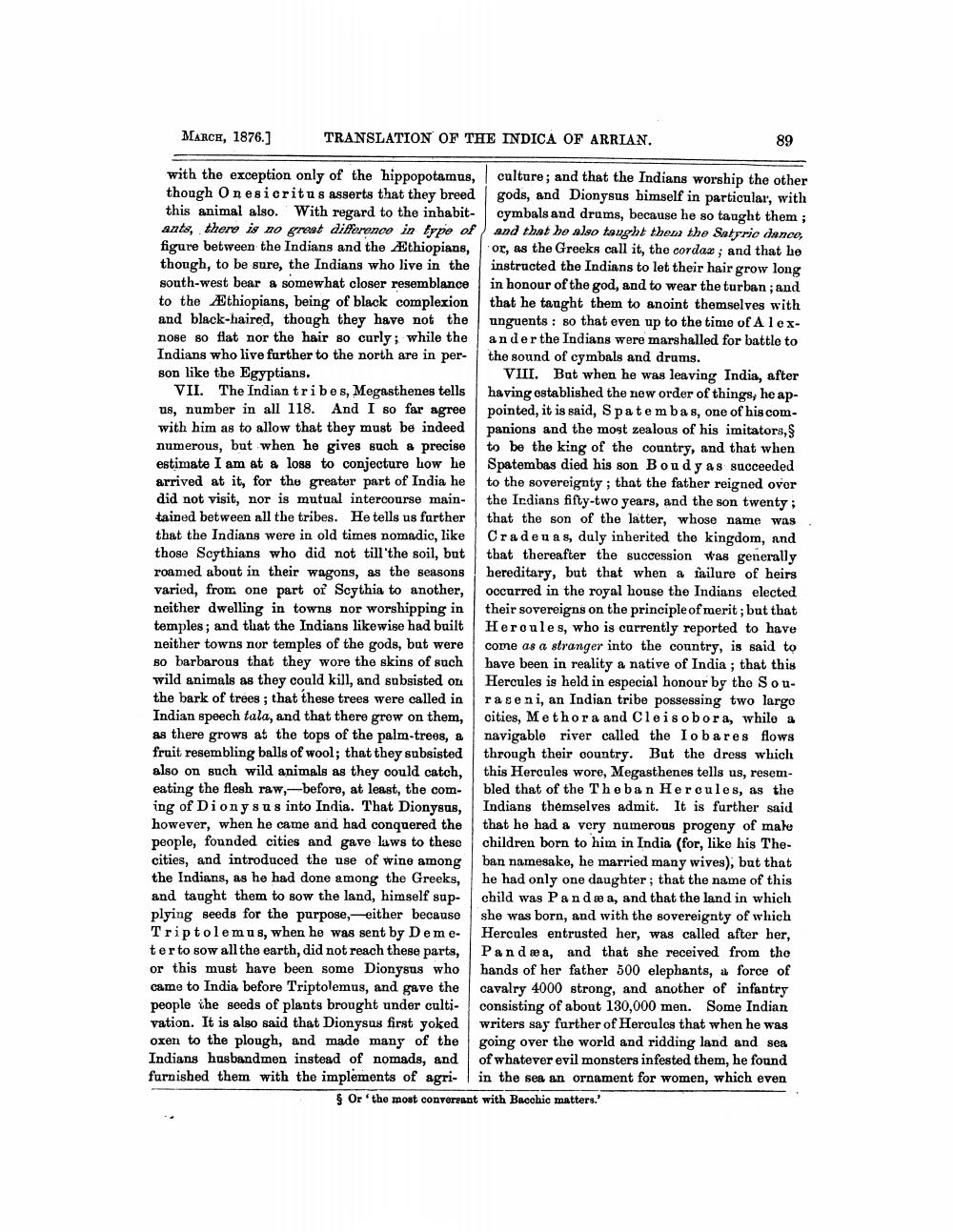________________
MARCH, 1876.]
with the exception only of the hippopotamus, though Onesicritus asserts that they breed this animal also. With regard to the inhabitants, there is no great difference in type of figure between the Indians and the Ethiopians, though, to be sure, the Indians who live in the south-west bear a somewhat closer resemblance to the Ethiopians, being of black complexion and black-haired, though they have not the nose so flat nor the hair so curly; while the Indians who live further to the north are in person like the Egyptians.
TRANSLATION OF THE INDICA OF ARRIAN.
VII. The Indian tribes, Megasthenes tells us, number in all 118. And I so far agree with him as to allow that they must be indeed numerous, but when he gives such a precise estimate I am at a loss to conjecture how he arrived at it, for the greater part of India he did not visit, nor is mutual intercourse maintained between all the tribes. He tells us further that the Indians were in old times nomadic, like those Scythians who did not till 'the soil, but roamed about in their wagons, as the seasons varied, from one part of Scythia to another, neither dwelling in towns nor worshipping in temples; and that the Indians likewise had built neither towns nor temples of the gods, but were so barbarous that they wore the skins of such wild animals as they could kill, and subsisted on the bark of trees; that these trees were called in Indian speech tala, and that there grew on them, as there grows at the tops of the palm-trees, a fruit resembling balls of wool; that they subsisted also on such wild animals as they could catch, eating the flesh raw,-before, at least, the coming of Dionysus into India. That Dionysus, however, when he came and had conquered the people, founded cities and gave laws to these cities, and introduced the use of wine among the Indians, as he had done among the Greeks, and taught them to sow the land, himself supplying seeds for the purpose, either because Triptolemus, when he was sent by Dem eter to sow all the earth, did not reach these parts, or this must have been some Dionysus who came to India before Triptolemus, and gave the people the seeds of plants brought under cultivation. It is also said that Dionysus first yoked oxen to the plough, and made many of the Indians husbandmen instead of nomads, and furnished them with the implements of agri
89
culture; and that the Indians worship the other gods, and Dionysus himself in particular, with cymbals and drums, because he so taught them; and that he also taught them the Satyric dance, or, as the Greeks call it, the cordas; and that he instructed the Indians to let their hair grow long in honour of the god, and to wear the turban ; and that he taught them to anoint themselves with unguents: so that even up to the time of Alexander the Indians were marshalled for battle to the sound of cymbals and drums.
VIII. But when he was leaving India, after having established the new order of things, he appointed, it is said, Spatem bas, one of his companions and the most zealous of his imitators,§ to be the king of the country, and that when Spatembas died his son Boudy as succeeded to the sovereignty; that the father reigned over the Indians fifty-two years, and the son twenty; that the son of the latter, whose name was Cradeuas, duly inherited the kingdom, and that thereafter the succession was generally hereditary, but that when a failure of heirs occurred in the royal house the Indians elected their sovereigns on the principle of merit; but that Hercules, who is currently reported to have come as a stranger into the country, is said to have been in reality a native of India; that this Hercules is held in especial honour by the Souraseni, an Indian tribe possessing two large cities, Methora and Cleis obora, while a navigable river called the Iobares flows through their country. But the dress which this Hercules wore, Megasthenes tells us, resembled that of the Theban Hercules, as the Indians themselves admit. It is further said that he had a very numerous progeny of male children born to him in India (for, like his Theban namesake, he married many wives), but that he had only one daughter; that the name of this child was Pandæ a, and that the land in which she was born, and with the sovereignty of which Hercules entrusted her, was called after her, Pandæa, and that she received from the hands of her father 500 elephants, a force of cavalry 4000 strong, and another of infantry consisting of about 130,000 men. Some Indian writers say further of Hercules that when he was going over the world and ridding land and sea of whatever evil monsters infested them, he found in the sea an ornament for women, which even
§ Or 'the most conversant with Bacchic matters.'




